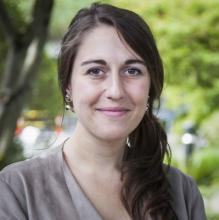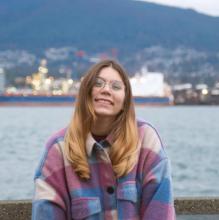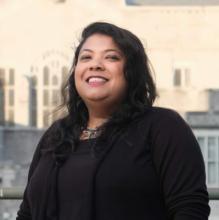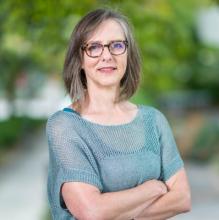Against a backdrop of designed obsolescence, diminishing repair knowledge, climate emergency, and a global pandemic, Michelle seeks to tell another story based on the empirical and conceptual inquiry into the aspirations of citizens participating in community repair initiatives. By highlighting the stories of communities engaged in efforts to imagine otherwise, and create different stories about what it means to live well, Michelle's work is part of a larger effort to reimagine the world that values responsibility, justice, and sustainability.
Research Description
In a world where the vision and design of technology tell us to aspire for the new and shiny, everyday electronics, including our digital devices, are increasingly made to be thrown away. However, right to repair advocacy, heightened environmental awareness, and pushback against corporate designed obsolescence practices in recent years has been accompanied by a grassroots resurgence in repair across North America and Europe. While digital platforms have made do-it-yourself repair information more accessible and available, community initiatives—where people meet in person to repair devices and everyday items together—are nevertheless growing in numbers and popularity. Set against a backdrop of designed obsolescence, diminishing repair knowledge, climate emergency, and global pandemic, my dissertation project forms an empirical and conceptual inquiry into the aspirations of citizens participating in community repair initiatives. Systems have been developed to gather data at community repair events, measuring the numbers and types of items repaired, tons of waste diverted from landfill, and estimating carbon emissions. These kinds of data provide a crucial role in monitoring and measuring waste reduction; however, they are less well-equipped to deal with other questions central to environmental issues, such as considerations of responsibility, justice, and values. Informed by the relational approaches of practice theory and socionarratology, my research explores how a storytelling lens might broaden conceptions of the information sources, systems, and stewardship engaged in climate adaptation. I ask how we might understand local repair initiatives as an example of communities engaged in efforts to imagine otherwise, telling different stories about what it means to live well with our technologies and with each other.
What does being a Public Scholar mean to you?
Public scholarship for me means that building sustainable and reciprocal relationships with community collaborators is conceived as a key part of the research itself, not a side product. Working on research in partnership with community-based information initiatives, I try to be attentive to where dominant research practices do not align with the needs, priorities and values of researched communities. As public scholars, I think we have a responsibility not only to communicate our work publicly, but to reimagine extractive research practices, honour the expertise of our participants, and question who benefits from our work.
In what ways do you think the PhD experience can be re-imagined with the Public Scholars Initiative?
Amidst the academic pressures to publish, acquire funding, complete dissertations, and get hired, it can sometimes be challenging to imagine beyond the academy. In providing space and support to enact and communicate public scholarship, I imagine the PSI could expand our conceptions and expectations of academic research and help foster an environment where diverse forms of scholarship are recognized and valued.
How do you envision connecting your PhD work with broader career possibilities?
With a background in community-engaged information research projects, I bring a theoretical understanding of the ways our information practices (e.g., using digital tools, learning to repair a laptop, telling stories) are entangled in societal and material relationships. Through a career of publicly engaged scholarship, I intend to engage complex socio-technical challenges posed by the changing climate through careful, critical, and collaborative engagement with information professionals, community organizations, technology designers, and policymakers.
How does your research engage with the larger community and social partners?
With support from the PSI, I am exploring collaborative opportunities for collecting, documenting, and sharing local stories of repair. I am working with repair organizations in Metro Vancouver to develop and design activities to engage repair organizers, volunteers, and visitors in narrative practices at public repair events: telling stories about their relationships with their objects, their experiences with repair, and imagining possible repair futures. In the spirit of the repair movement, rather than designing a new system or program, I intentionally engage with initiatives that are already ongoing, in order to recognize, learn from, and sustainably support the work of communities developing local capacity for climate adaptation. Documenting and telling stories of repair through this PSI project will help me and my collaborators to learn more about how people change their relationships with their things, explore new ways to understand the social benefits of local repair initiatives and articulate these benefits to the public, policy-makers, and sponsors.
Why did you decide to pursue a graduate degree?
After writing an art history thesis, I wanted to learn how I could support others in their own research practices, which brought me to the field of Library and Information Studies. My decision to pursue doctoral research was motivated and informed by the people and projects with whom I’ve had the opportunity to work, including as a volunteer with a local repair café, as a founding member of a language exchange co-operative, and as a research assistant with the Heiltsuk Language and Culture Mobilization Partnership. All of these initiatives, in different ways, offered examples of communities engaged in efforts to redesign their relationships with information tools and technologies to work towards better futures, as well as the challenges of doing so. This information work is often hidden and undervalued, yet from their example, I was inspired to better understand the ways in which the daily information practices we take for granted are implicated in efforts for social change, such as Indigenous sovereignty and climate justice.
Why did you choose to come to British Columbia and study at UBC?
I decided to move to Vancouver from my home in southwest England because graduate study offered a new challenge to live and learn in a new country and UBC had a strong reputation for welcoming international students. Learning about the xʷməθkʷəy̓əm territory that UBC occupies, and from those who have cared for the land for thousands of years, has been a formative part of my educational experience here.




